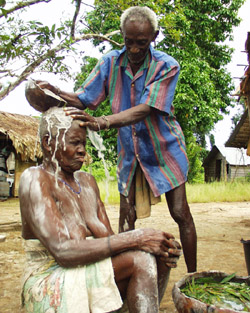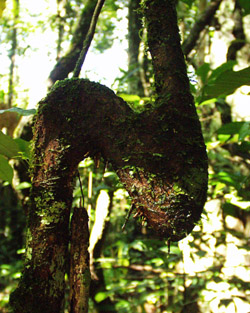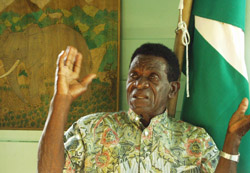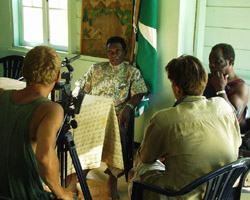| Winti Ceremony - The
Voice of the Paramacca
As promised today begins
with a Winti cleansing that Moises performed on his wife, Amalensie.
Arising at dawn I watched Moises as he made the herbs that he collected
yesterday into a potion (Agwa) with which he was going to wash his wife.
Taking the leaves of at least seven different herbs, ferns and lianas
he crushed and twisted them in his gnarled old hands and put them into
a big bowl. Between each layer of different leaves he sprinkled chalk
(or Pemba) and on the top he sprinkled the crushed bark of a rubber
tree. Then he added water and beckoned to his wife to come to be washed.
What happened next took us all by surprise. Suddenly Amalensie beating
her breasts went into a convulsive fit. Moaning and quivering she crumpled
to the floor gripping her husband's arm. Moises, ever the caring companion,
acted fast. Taking his pot of Pemba he covered her with chalk and then
taking the Agwa he began to wash his wife from head to foot. Slowly
her convulsions began to subside and the quivering in her limbs began
to calm. The whole thing seemed to be over almost as quickly as it began.
I felt that strange feeling that I get when I see an accident, my legs
were shaking and my mind spinning with a hundred questions.
We sat with Johannes our guide for a long time trying to make sense
of what we had just witnessed. The first thing to point out is that
the cleansing is just one part of part of a long process. Some time
ago Amalensie had disturbed a forest Winti spirit. She had gone with
Moises for a couple of months into the forest to tap rubber trees. Women
have to follow strict rules during menstruation. They must not walk
through the forest or go to the rivers or creeks during this time. In
every Maroon village we have been to we have been shown the menstruation
house where women are meant to stay during their period. As Moises and
Amalensie were in the forest for over two months, it was impossible
for her to observe the normal rules. She was walking through the forests
and fishing in the rivers to catch food while her husband was working
to collect rubber to make a bit of money. In doing this she angered
or upset/disturbed the Fodu Winti. The Winti spirits are either ancestral
(often warrior) spirits, or they are forest spirits.. The Fodu Winti
is one of the latter. Shortly after this she began to suffer a recurring
affliction.
It is important to pick my words carefully. Describing these things
in English it is hard to be accurate. She was not sick or ill in the
way we would say. The Obeyaman (medicine man) does not heal Malaria
or other specific medical ailments, rather he deals with a different
realm... an order of things, and a relationship between people and their
surroundings, laid down through centuries of practice and imported on
the slave ships from Africa.
Amalensie had crossed a line and what we witnessed this morning was
part of the process to bring her back into line with that disturbed
order. When she comes out of the affliction she will be a different
person with a different place in the order of things. Every Obeyaman
is a specialist and controls a small number of the numerous Winti spirits.
Amalensie will have to find an Obeyaman who is the 'boss' or Master
of the Fodu Winti. He will make for her a stool/bench (Bangi) and a
table (Tafa) for her and he performs a ceremony. After this she becomes
a spirit-medium for the Fodu Winti. People can then come to her when
they have a problem. She sits on the Bangi, at the Tafa and becomes
an intermediary to the world of the Winti spirits. What we saw this
morning was an interim measure. Amalensie has not been able to find
the Master of the Fodu Winti yet. So in the meantime, every few months
she must perform a trance like we saw this morning to pacify the Fodu
Winti. She is saying 'Stand-by ... I know I've disturbed you ... I'm
still looking for your master.."
By Nine O’clock it was all over. Amalensie reappeared in her best
frock and the tiny group of huts that make up Moises' village had returned
to calm. It was time for us to leave. We have become used over the last
months to arriving in places, placing ourselves in the middle of other
people’s lives, and then moving on again. As I said goodbye to
Amalensie, and as Moises waved to us as we drew away in our boat it
was like we were old friends and parting was difficult. We have made
many such friends on this trip but their faces will stay with us for
a long time. It seems absurd to think that we only met them yesterday
afternoon.
Before heading to Langa Tabiki we returned to the spot where we had
first met Moises yesterday. I had forgotten to get a shot of the "Koan-Tikki"
that he had showed us. The "Koan-Tikki" is a sign, of which there are
many in the forest. These are features in the trunks of trees and vines
that mark them out as special. Before clearing land for cultivation
the Obeyaman must cleanse the area so that the people don't get problems
from the forest sprits. If someone was to cut or burn a Koon-Tikki by
accident (and many are situated high in trees) then a relative of that
person is afflicted in some way. As Johannes pointed out this is a very
effective form of social control. The whole family get angry with a
family member who stops paying attention to the old ways.
During our short trip to Langa Tabiki we passed the Paramacca Creek
that the Paramacca people take their name from. It was a good time to
fill in some of the history of this noble people. They are the first
to point out that they are the only Maroon or Bush-Negro Tribe here
that never signed a freedom treaty with the Dutch slavers. They fought
for and won their freedom and don't need a piece of paper from a Dutchman
to tell them that they are free. Their story is amazing. Further up-river
live the Aukanas, another Maroon Tribe. In 1760 thy signed a treaty
with the Dutch slavers in which they were granted their freedom on one
condition. Any slaves escaping after the agreement would be returned
by the Aukanas to the Dutch. So the Paramaccas' first years were spent
between the twin threats of the Dutch and their own African brothers
- a rock and a hard place. As a result they lived in hiding up the small
Paramacca Creek, and then later set up all their villages on islands
which were easier to defend from these dual threats. Today the Paramacca
Creek is reserved as a burial ground for the tribe. We passed on respectfully.
The Paramacca people, like all the Maroons of Suriname are divided into
Los or clans. They do not have family names so often these names are
used as surnames when officialdom from Paramaribo requires. The names
are taken from the names for the plantations from which their descendants
escaped. Next week we will be travelling with Martin Misidian to Saramacca
territory. Misidian is a derivative of Mista John - a plantation owner
of old. It is a rare privilege to be travelling in this area with so
many extraordinary stories of old that still resonate strongly with
life today.
To this day the Paramaccas are a proud and independent people with the
strongest sense of identity of any group of we have met in Suriname.
This afternoon we went to meet with Granman Levi - their leader. Armed
with our experience of Granman Gazon of the N'Dukas, and Granman Asongo
of the Trio people we offered Granman Levi the same opportunity - a
platform to address the issues effecting his people - He jumped at the
opportunity. Here is a transcript of what he says... once again in shows
the way the people of the interior feel they are mistreated by the powers
that be in the Capital.
"They (the people of Paramaribo) come looking for us during the elections.
We give them the power with our votes. Then they give the licence to
outsiders to come and take the forest away... our gold, our wood, our
bauxite. But I am the Granman of the Paramacca and they don't even ask
my opinion".
As the end of the video shows, this evening we talked to Joseph, one
of Granman Levi's Captains. He points out that the Paramacca people
fought for, and won their freedom centuries ago and yet they still have
to struggle to defend their land and their rights to this very day.
The village is awash with Brazilians, illegal outsiders accompanied
by their whores; their eyes, sunken by the search for gold. They walk
around shiftily in vivid contrast to the proud gait of the Paramacca
who continue to hold their heads high.
|

The Final Preparations

Fodu Pays a Visit

Koan Takiti - Do Not Disturb

Granman Levi

The Window of Opportunity
|










